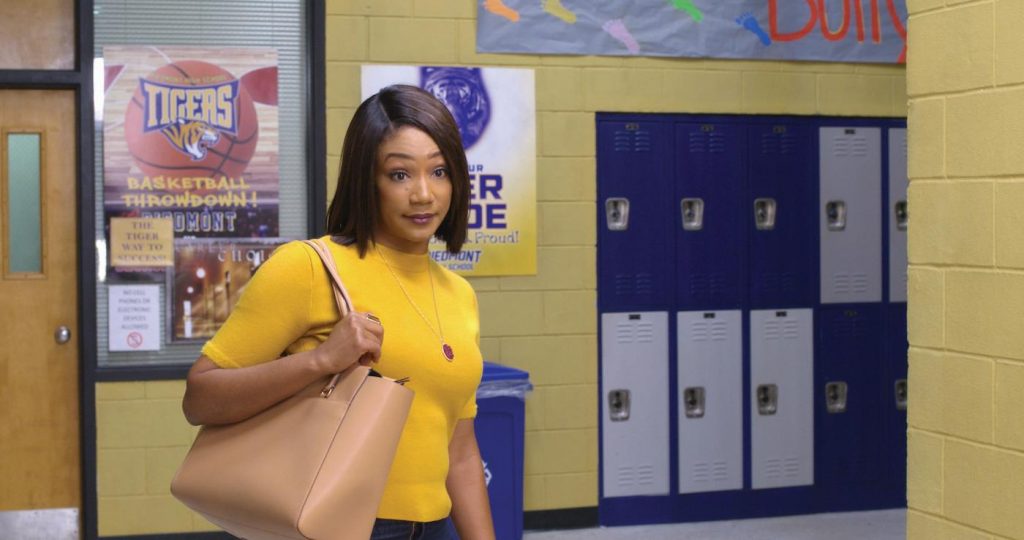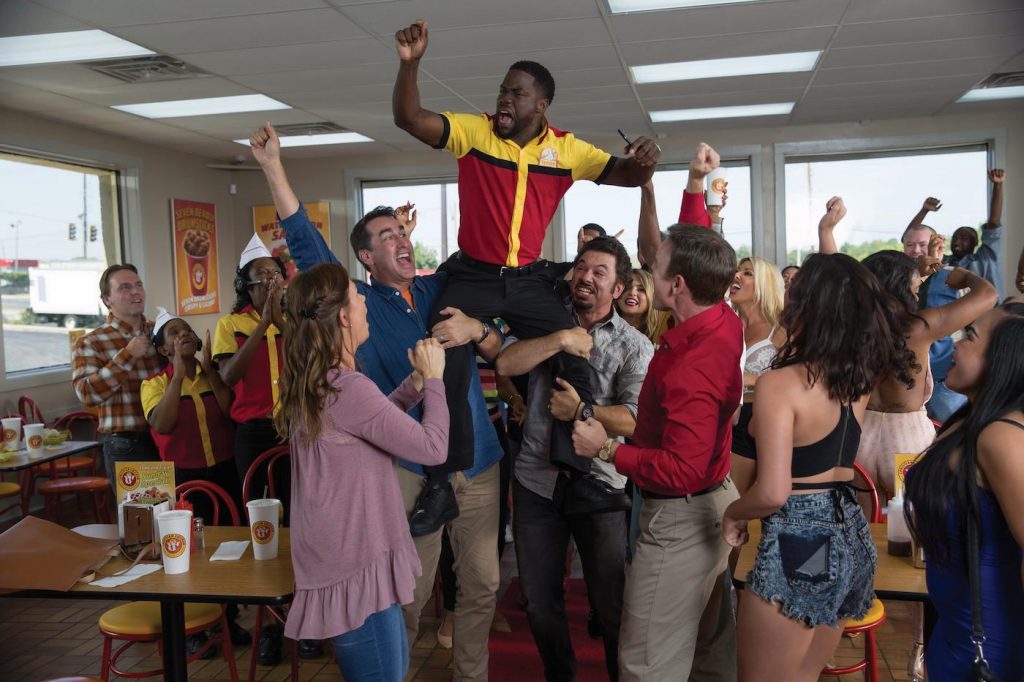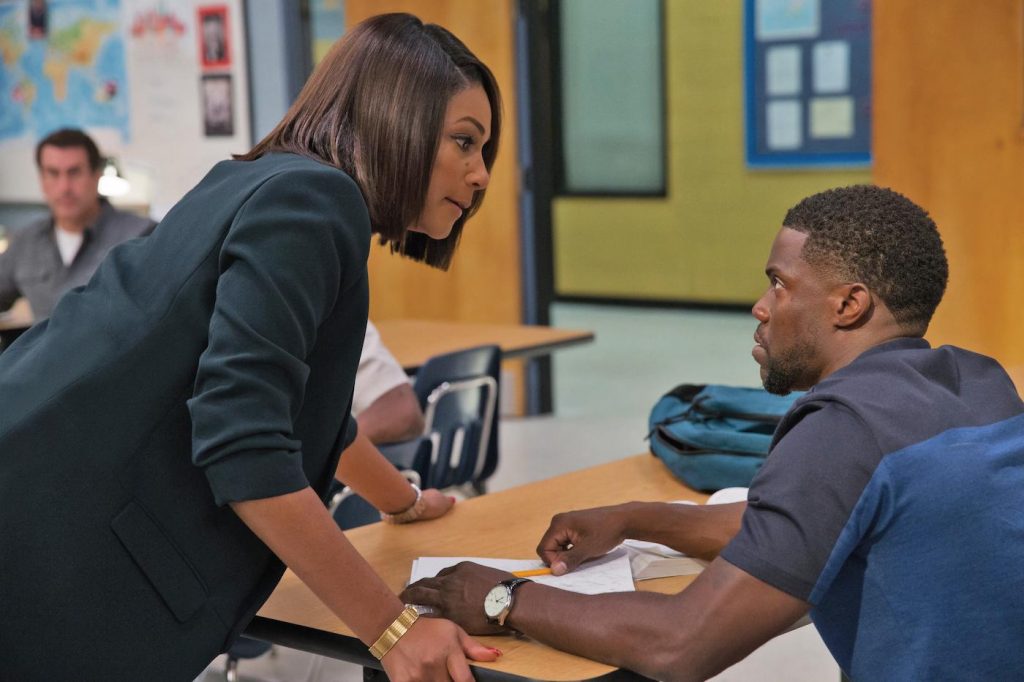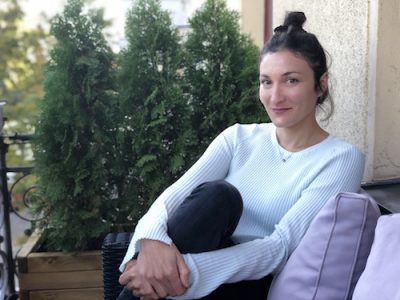Three of Night School’s Writers on Developing the Hilarious Script
Is Night School the next Girls Trip? Like its predecessor, it’s simultaneously goofy and excellent, as well as helmed by Malcolm D. Lee, in which he directed Tiffany Haddish in her breakout role. Here, Haddish co-stars with Kevin Hart, who plays Teddy, a terrible high school student who grows up to be an ace barbecue salesman. All looks reasonably bright for Teddy until he accidentally burns down the store that employs him, forcing him to go to night school. Less over the top but no less funny than Dina, her character in Girls Trip, Haddish turns out to be not just the woman he gets into a Dada-esque argument with in traffic, but his incorruptible night school teacher, Carrie.
Though the best barbs undoubtedly go to the yin and yang of no-nonsense Carrie opposite Teddy, a real chaos muppet who’s just trying to do good, Night School is an ensemble work. Teddy’s classmates are accurately plucked from small towns everywhere. Taran Killam plays the token nerd-turned-principal on a power trip with repellant accuracy. Ben Schwartz, in a role not far from his John-Ralphio days, is all too real as the finance bro who chipperly tells Teddy not to worry about the destroyed barbecue business—with his GED, Teddy can just get a job at his company, where nobody really knows what they’re doing, anyway.
Of course, it’s not as simple as that. And whether Teddy is trying to suavely navigate his relationship with his beautiful, accomplished girlfriend, Lisa (Megalyn Echikunwoke), or completely spiraling out of control, the movie’s writers use these situations to deftly touch on one relevant 2018 theme after another, from abysmal teachers’ pay to living paycheck to paycheck. References to robots replacing jobs and the dangers of materialism are couched among zingy one-liners, crashes, and explosions. Stewart, Teddy’s high school nemesis and now his principal, claims “I don’t hear color,” after Teddy calls him out for veering into rap and hip-hop references, from behind his principal’s desk. The absurdity is laughable, in the moment. But it’s also a little too close to the kind of real-life tone-deafness that isn’t very funny at all.
The Night School script was the brainchild not just of Hart, but Hartbeat Productions writers Joey Wells, Harry Ratchford, and Matthew Kellard, with additional work by Nicholas Stoller. It’s hard to tell where the script ends and the ad-libbed one-liners, at which Hart and Haddish excel, begin. We spoke with Wells, Ratchford, and Kellard on the process of letting the movie get to where it needed to go organically, taking inspiration from their own public school experiences, and subtly acknowledging social issues in what is a very funny movie.
Joey and Harry, you’ve worked with Kevin Hart before. Can you tell me how work on the script got started?
Ratchford: We’ve joined Kev on all his standup specials. I started with the first, and I think Joey came in on the second. Basically, Kev came in with a pitch he’d been knocking around in his mind for a second. He thought it was a funny situation to put adults in high school and have them act as if they were high school students. Once he pitched that to Universal, we got hired and started layering in storylines off of that premise.
Did you write Tiffany Haddish’s character, Carrie, with Haddish in mind for the role?
Ratchford: That came about organically. With Will Packer producing the film — and he had recently worked with Tiffany Haddish on Girls Trip — it was a suggestion by Kevin to have her play the role of Carrie, the night school teacher. They felt like that would be a different type of character for her to pull off.

What was the inspiration for Carrie?
Ratchford: I think the thought was, what kind of person would be able to handle all these personalities, all these different character traits when we brought the whole ensemble into the class. When we wrote the character, we were just thinking, what kind of character would do that? She would be very ambitious, have kind of a rough side to handle a class like that.
Wells: And when you go to night school, for the teachers who teach night school, it’s almost like it’s their secondary job. And they have other aspirations, too, so sometimes it’s almost like, ‘hey, I’m doing you guys a favor, and you don’t want to listen.’ ‘I could be doing something else,’ is almost the attitude of her character.
An early scene, when Teddy, Lisa, and their friends go out to dinner, goes from dealing with money to pubic hair to racism in a matter of minutes. How did you guys approach funny but complex scenes like that?
Ratchford: It wasn’t part of the original script. That scene just kind of came about as we started fielding notes, afterward, trying to have a mini set piece at the beginning of the film. We had to paint Teddy as someone who looked like he had it together, but actually, his whole life was built on this house of cards. So that just kind of played into his character arc, as far as not being able to pay for the bill. What would he do in that situation? That’s what came about from notes.
How did you cast the rest of the night school students?
Kellard: We wanted to pick a round robin of reasons why people would be in night school. It was different characters every draft we did. The characters that ended up in a shooting draft are a product of the iterative process on drafts. But the original thought was, why do people go to night school? You might go because you’re not a citizen and you’re working on your personal education; you go to night school because you were a teen mom and dropped out, so you want to go back, so that’s how we developed each character. Then we thought about how those characters would relate to each other once they got in the same room.

How was your experience working with Malcolm D. Lee, following his success with Girls Trip? Was the writing underway before Girls Trip came out?
Ratchford: Matt has kind of gained a reputation for being able to bring ensemble pieces together. So that was a situation where Kev, working as a producer, and his relationship with Will Packer, they just kind of talked about it and it came together. A lot of the casting and a lot of the decisions came after the script, and after everyone got a chance to read it, they started to assemble the team.
Kellard: Working with Malcolm was great because we had a rare opportunity to go to set, be there every day, and we have such a team of improvisers in this movie, they would play with the script, and then we’d play with the script, after shooting was done for the day. Then Malcolm would say, like, I’m not really feeling this one moment, can you give me some alternative dialogue or an alternative comedy beat, and then we’d go back and work on it. We really worked closely with him day to day on set, which is something I think is pretty rare for feature writers.
Given the flexibility with the final script, was there much ad-libbing in the film? Did you end up with a lot of unexpected one-liners?
Kellard: So many.
Ratchford: It kind of focused on Kev a lot, but then as we got down to shooting, finishing up, and getting into the production of it, a lot of the actors took one-liners and things of that nature.
Matt: There are moments in every scene that are totally improv-ed, and I think that’s a bit of Malcolm’s style of working. He lets people throw things in there. Like the scene where Teddy is saying goodbye to Yvonne Orji’s character [Maya], and he’s yelling different things after her, every take was different. That’s just how Kevin works in his movies in general.

I can imagine Tiffany Haddish also had some great ad-lib moments.
Wells: [She had] great ad-libs throughout the entire movie. I think when you work with an ensemble like this, the director has to feel comfortable and make the actors feel like, this is where we’re trying to get, and I trust you with that. As Harry said, Kevin is one of the best at ad-libs, and you see Tiffany Haddish, and she just goes. I think Malcolm really let the actors go and just get there. I think that makes this a little different than directors who say, let’s just stick to this and let’s trust the work on paper, whereas sometimes [here it was] ‘let’s just trust the actors to get there.’ And I think he did a great job.
How did you come up with a Christian chicken joint for Teddy’s second job?
Kellard: That was in the Stoller draft, so we should give some credit to Nick Stoller [another of the film’s writers] for that. That [location] came up with Kevin as we were moving to the next draft, and I think Chick-fil-A is the obvious touchstone idea.
Ratchford: We definitely wanted to bring Kevin’s character all the way down to zero, to have him spiral down. What more could a black character do than dress in a chicken suit? That’s when you hit rock bottom. We had to bring this character down to ground zero, Stoller tapped into this chicken place, and it just kind of went from there.
Kellard: That moment where the woman’s holding his hand too hard in the prayer circle, that was one of those moments where it was all about the moment. That was not scripted or anything, and I even think the woman who was the background talent made that moment work, and Kevin played off it.
The film touches on so many topics that are in the news a lot right now, from living paycheck to paycheck, to deplorable teacher pay, to the financial industry being run by bullshit artists. How did you choose your references?
Kellard: I just feel like life was the inspiration for a lot of that stuff. That’s what always drew me to the project, was making a movie about people that sort of live in the margins. Some of the early drafts, we tapped Harry’s experience in public school and all of our experiences, but in particular, Harry in the south going to public school.
Ratchford: I had a brother who went to an alternative school which was for troubled youth, so it had a reputation as kind of a tougher school. They had a principal in there who was an ex-marine, and he kind of ran the school that way. That was an inspiration for Taran’s character [Stewart, Teddy’s nemesis], from a principal from my hometown in South Carolina. There was an incident during a football game when someone threw a tear gas bomb on the field, and everybody got sick, but I just remember him walking through a cloud of smoke and tear gas, telling everybody, ‘don’t rub your eyes! don’t rub your eyes!’ That was just who he was, and that was the inspiration for Taran’s character [even though], a ‘lean on me’ kind of guy, but a kind of ‘lean on me’ spoof of Taran’s character came out, too.
It sounds like it was a fun writers’ room.
Kellard: It was. But I also wanted to say, in terms of the social issues question, I think we were all inspired by badass teachers who survive in this environment and are able to educate, despite the whole system being arrayed against them. I do think it’s relevant right now, when public school teachers, mostly women, are essentially leading the way, kind of fighting back against a system that’s sometimes collapsing. In Chicago, West Virginia, Oklahoma, and now, potentially Los Angeles, teachers are the ones who are fighting back and winning on behalf on all of us. If this movie, in our kind of silly way, can shine some light on what teachers are dealing with, that’s great.
Featured image: TIFFANY HADDISH stars as night-school teacher Carrie and KEVIN HART stars as her student Teddy Walker in “Night School,” the new comedy from director Malcolm D. Lee (“Girls Trip”) that follows a group of misfits who are forced to attend adult classes in the long shot chance they’ll pass the GED exam. Photo Credit: Eli Joshua Adé



